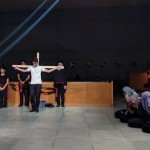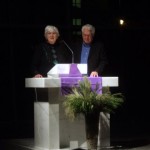Just a few words on our first reading for today’s Mass. God is fed up with the sins of King Saul and wants to anoint a new king. He sends Samuel to Jesse who lives in Bethlehem. Each one of Jesse’s sons I presented to Samuel and each time Samuel is impressed with the son Jesse presents to him and each time God tells Samuel, this is not my choice. Samuel finds out Jesse has one more son, his youngest who is just a kid and is doing the mindless job of minding the sheep. He’s brought to Samuel and God’s tells Samuel, ‘anoint him, this is the one.’
We can imagine the tension this caused in Jesse’s family, the annoyance of his sons that their kid brother was God’s choice but that is how David’s journey to kingship began.
So many time God chose what we might call ‘nobodies’ to do great things. Moses was tending his father –in- laws sheep when God called him and Amos was caring for sycamore trees when he was called to be God’s prophet. God ignored Isaiah’s protestations of weakness when God called him to be prophet.
St Paul, who saw himself as the least of the Apostles wrote the Christian community as Corinth, ‘ it is the weak things of this world that God has chosen to shame the strong, and the foolish ones to confound the wise and the ones that are not to reduce to nothing the things that are.’ Christ called Peter, Andrew, James and John, who were mending fishing nets, what could be more boring, to follow him into an unknown future.
In today’s gospel Jesus choose a blind beggar, an ignored, un-named man people walked by every day as they went to pray or offer sacrifice to be the opportunity, the challenge to the religious authorities of the temple to come to see Jesus for who he was. All to no avail. They banished this man whom they saw as an ignorant fraud, from the temple and so remained blind to the reality of Jesus, the light of the world. There are none so blind as those who will not see.
We may think we are of no importance, of no influence but God can use our littleness, our limitations to touch the lives of others. We have parishioners helping out at food banks and soup kitchens and meals on wheels. We have people from our parish visiting shut ins. We have little people doing so many little things that seem so unimportant. But, as the song sings, ‘little things mean a lot.’ We shouldn’t underestimate what God might call us to do. To quote Cardinal Newman;’ God has created me to do him some definite service; He committed some work to me which he has not committed to another. I have my mission. God has not created me for naught, he knows what he is about.
This is true for each one of us. We may not feel very important or powerful or very wise but God has a project for each of us. It may be something important or something trivial but if we don’t do it, it won’t be done. We have within ourselves the power, the ability to act, to encourage, to support, to be there for someone who needs us. We are all given a voice to say ‘I’m sorry’, I forgive, and I am here for you, little words that can make a great difference to other people.
God is in the habit of asking weak and unimportant people to do great things and little things.
Will we have the generosity of the young man Samuel when God called him to service and answer ‘here I am Lord send me, and do whatever God calls us to do, no matter how trivial, how unimportant it may seem to me, it can make a great difference to others.
 Founded by St. Paul of the Cross, every Passionist takes a special vow to spend his or her energies in promoting remembrance of the sufferings of Jesus, the memory of the Cross, and reflection of the meaning of the Cross for the world.
Founded by St. Paul of the Cross, every Passionist takes a special vow to spend his or her energies in promoting remembrance of the sufferings of Jesus, the memory of the Cross, and reflection of the meaning of the Cross for the world.




